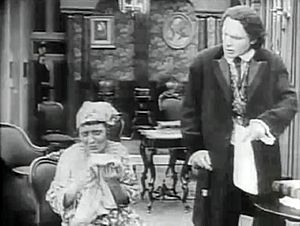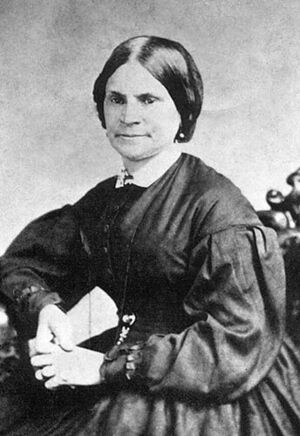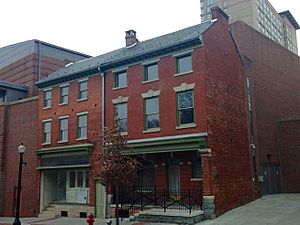Lydia Hamilton Smith facts for kids
Lydia Hamilton Smith (born February 14, 1813 – died February 14, 1884) was an important African American businesswoman. She was also the trusted housekeeper for a famous politician named Thaddeus Stevens for many years.
Contents
Lydia Smith's Early Life
Lydia Hamilton was born near Gettysburg, Pennsylvania in Adams County, Pennsylvania. Her mother was of African and European descent, and her father was Irish. Lydia married a barber named Jacob Smith, and they had two sons. Sadly, her husband passed away in 1852.
Working with Thaddeus Stevens
In 1847, Lydia Smith moved to Lancaster, Pennsylvania, with her mother and sons. She began working as a housekeeper for Thaddeus Stevens. Stevens was a well-known lawyer and a strong supporter of ending slavery, known as an abolitionist. He later became a member of the U.S. House of Representatives. Lydia Smith managed his homes in both Lancaster and Washington, D.C., until he died in 1868.
People described Lydia Smith as someone who paid great attention to her appearance. She was known for her calm and dignified manner. She had two sons, William and Isaac. Her older son, William, sadly died in 1861. Her other son, Isaac, joined the army in 1863 during the American Civil War.
Thaddeus Stevens treated Lydia Smith with great respect. He called her "Mrs. Smith," which was unusual for a Black servant at that time. She managed social events for him and even mingled with his important guests. These guests were told to call her "Madame" or "Mrs. Smith." Some newspapers even claimed people often called her "Mrs. Stevens" because of her important role and close connection to him.
When Thaddeus Stevens passed away in 1868, Lydia Smith was by his side. In his will, Stevens left her money and allowed her to choose any furniture from his house. With this inheritance, Lydia Smith bought Stevens's house and the land next to it.
Lydia Smith: A Smart Businesswoman
Thaddeus Stevens and Lydia Smith were both involved in the Underground Railroad. This was a secret network that helped enslaved people escape to freedom. Their house in Lancaster even had a hidden passageway that historians believe was used to shelter escaping slaves.
Lydia Smith bought her own house next to Stevens's house in Lancaster in 1860. During the Battle of Gettysburg in 1863, she showed great kindness. She gathered food and supplies from neighbors and delivered them to the wounded soldiers from both sides.
After Stevens's death in 1868, Lydia Smith became a very successful businesswoman. Besides owning Stevens's house, she ran a busy boarding house in Washington, D.C. She also invested in real estate and other businesses, showing her sharp business skills.
Death and Legacy

Lydia Hamilton Smith died in Washington, D.C., on her 71st birthday in 1884. She was buried in St. Mary's Catholic cemetery in Lancaster, as she wished. She also left money to help maintain Thaddeus Stevens's grave.
Lydia Hamilton Smith's story has been told in movies. In the 2012 film Lincoln, actress S. Epatha Merkerson played her.
Images for kids
-
In the 1915 film The Birth of a Nation, characters Austin Stoneman and Lydia Brown were based on Thaddeus Stevens and Lydia Hamilton Smith.
 | Bessie Coleman |
 | Spann Watson |
 | Jill E. Brown |
 | Sherman W. White |




